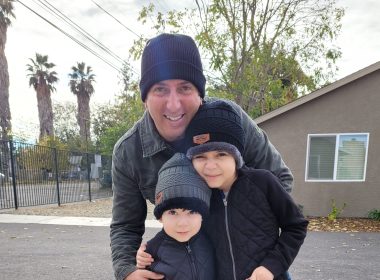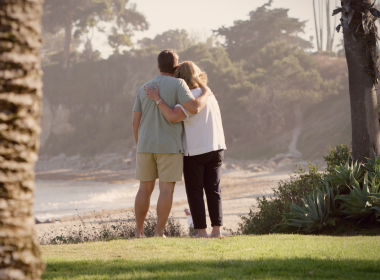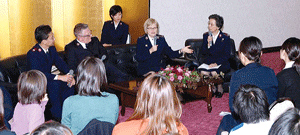What Must We Do to Do the Work God Requires?
by Major Roland Sewell –
The public expects to see The Salvation Army at the scene of natural disasters and major incidents in the U.S. and even in countries with fewer resources. Salvationists respond where they can, with whatever they can, when a disaster strikes.
In the last two years, Salvationists and volunteers have brought relief to people in crisis ranging from floods in the Czech Republic, the U.S., and Chile; to earthquakes in Japan and the Philippines; to cyclones, hurricanes and tropical storms in the Caribbean and the Indian subcontinent; and to drought in South Africa, Zambia, and Zimbabwe.
In addition, the resources of relief agencies are taxed by the explosion of “complex humanitarian emergencies.” These occur at the world’s “hot spots” and frequently follow major political disruption or result from civil war.
They are typically associated with widespread starvation, economic collapse, genocide, mass displacement of people and total breakdown of social and physical infra-structure. We watch 42 of these “hot spots” closely from the comparative comfort of the office of Emergency and Refugee Services at International Headquarters.
Frighteningly, 26 are armed conflicts. Moreover, there are around 30 waiting to happen. Almost all are civil conflicts waged over nationalism, ethnicity and–frequently–in the name of religion. Afghanistan, Angola, Caucasus, Central African Republic, The Congo, DPR Korea, Sierra Leone, Bosnia, Rwanda, Somalia, Sri Lanka, Cambodia, Mozambique, Liberia, and Northern Ireland are just some on the list.
Natural disasters have accounted for three million deaths and affected eight hundred million in the last 20 years. In the last three years, complex emergencies in these “hot spots” are estimated to have exceeded this number. As always, the innocent and vulnerable suffer most, and the cry from any caring human being watching as the satellite brings vivid pictures into our living room via the television is, “What can we do?” The Christian may repeat the words of the disciples to Jesus, “What must we do to do the work God requires?” (John 6:28)
With its international resources of officer and lay personnel in more than 100 countries around the world, and its commitment to compassionate service, The Salvation Army is ideally suited to respond with the work God requires.
It claims no political motive and its members worldwide have a range of specialist skills in essential disciplines appropriate to bringing relief. All accept a line of command and a common motivation which makes them ideally suited to the work. If there were ever a front line where practical Christian service is needed without discrimination, it is in these “hot spots.” In many, the Army is already present.
Physical and emotional trauma make people vulnerable. They are also spiritually sensitive. This places a special responsibility on Salvation Army relief workers to respond to the need with genuine humanity.
While relief work is highly rewarding, as homes, lives and livelihoods are influenced for good, it can also carry risks and is highly demanding. To respond, International Headquarters has established an office to coordinate, train, equip and prepare workers for emergencies. The work in Rwanda and Bosnia are two of the programs that have been initiated and supported from this office.
The Salvation Army is not just a relief agency. Its God-given mission is much broader. Relief agencies with a more singular mission can afford to be focussed solely on fund raising for relief. The Salvation Army’s work with people in crisis covers a spectrum of need, and has to spread its limited resources much wider. It needs people and funds to respond immediately to an emergency, needs have to be assessed, and people and funds are often overcommitted.
Despite this, so far 60 officers, soldiers and Christian volunteers between the ages of 22 to 67, from 17 countries, have contributed their skills in agriculture, administration, building, education, engineering, health, logistics, motor mechanics, nutrition, social work and pastoral care. Some have been seconded from their regular appointment: others have taken time off. Some have had no specialist skill to offer, but have attributes that through training have enabled them to contribute to teams working in the field.
All the indicators show that “hot spots” will continue to flare up, and, with them the need to improve and extend the response of the Army. I believe God wants and has prepared The Salvation Army to bring his holistic Gospel to these situations through compassion and competent relief.
To do so, we need to better mobilize our resources. Our two major handicaps are assembling a database of appropriately skilled and available personnel, and having the core funding to coordinate support and resource a response before specific appeal funds flow.
If God is leading the way, I have no doubt he has also prepared his people and is ready to provide the resources. “Jesus answered, ‘The work of God is this: to believe in the one he has sent’.”
Note: I invite any who have a skill and commitment to this type of service and could be available for a period of between two and six months to apply to be included on The Salvation Army’s database of relief personnel at International Headquarters. Please direct your offer with a résumé through your territorial commander.
For more information, send an email that includes your name, address, area of expertise, previous experience, and availability (how soon/for how long) to International Headquarters:
Emergency@Salvationarmy.org
The Salvation Army is a major provider of service to persons in crisis around the world. We are there for those who need us in the name and spirit of Christ. ‘I knew you would be here!’ is a phrase Army volunteers have heard often enough in disaster situations. We want to be there. We ought to be there. A global network of supporters and volunteers makes that possible. Often, it opens the door to a credible and convincing witness to the love of God in Jesus Christ in the midst of the most difficult and resistant circumstances.
Paul A. Rader
General








